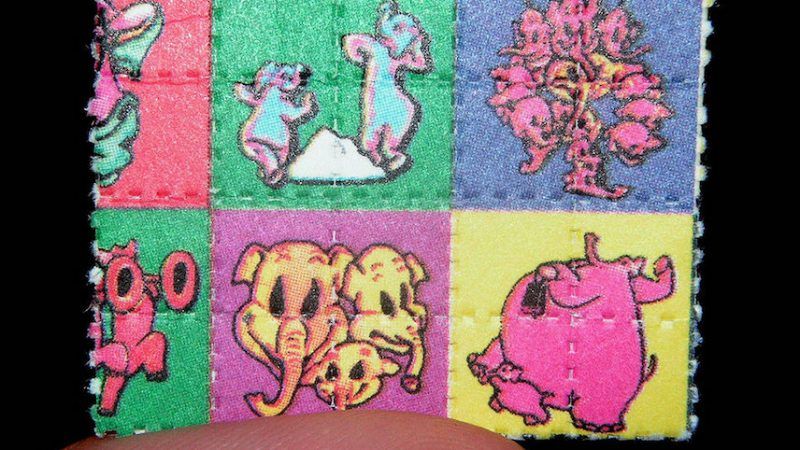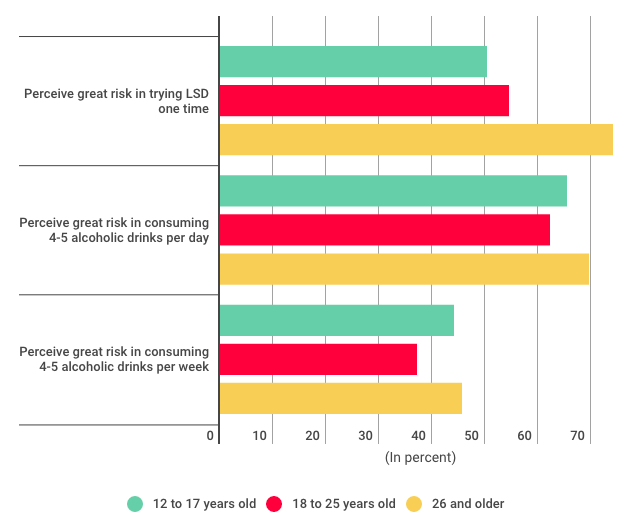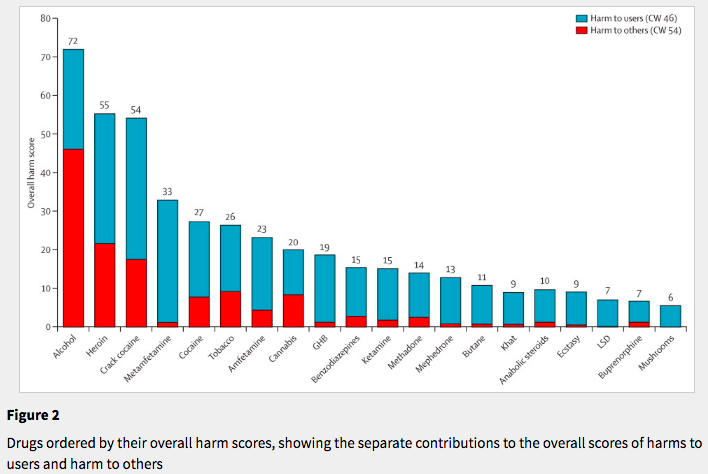American Adults See Occasional LSD Use As Riskier Than Regular Binge Drinking. It's Not.
Fifty years of scaremongering have turned LSD into a bogeyman.

Americans roughly equate the danger of trying LSD once or twice with consuming four to five alcoholic beverages a day, a testament to our country's drug warriors.
Across all age groups, 69.5 percent of respondents "perceive great risk" in trying LSD once or twice, while 68.3 percent of respondents feel similarly about "having four or five drinks nearly every day," according to new survey data released by the Substance Abuse and Mental Health Services Administration. Among respondents over the age of 26: 74 percent saw harm in trying LSD once or twice, while 69 percent saw harm in consuming nearly half a dozen drinks a day.

Alas, a majority of American adults are wrong (our youths much less so). Although included in schedule I of the Controlled Substances Act, LSD is a relatively safe, non-habit forming drug, while alcohol is a hepatotoxic sedative that kills roughly 80,000 Americans every year (37,000 of those from liver disease, 9,967 in alcohol-related driving accidents).
In the interest of opening the Overton Window of discourse ever so slightly, let's go through some studies.
In 2010, the British psychopharmacologist David Nutt measured the relative harms of various legal and illegal drugs with a system designed in coordination with other members of Britain's Independent Scientific Committee on Drugs. The committee used 16 criteria to determine a drug's potential harm to the user and to society. The criteria range from easily measurable (drug-specific and drug-related mortality; risk of physical and/or psychological dependence); to nebulous (international damage and community impact). Nutt's team then weighted those factors, combined them into an overall harm score, and, in a paper published in The Lancet, laid the scores out in a very nice chart:

As you can see from the x-axis labels, alcohol is the most harmful drug, followed by heroin. LSD is the third least harmful after buprenorphine (which is common in medication-assisted therapy for opioid use disorder) and psilocybin mushrooms.
The relative safety of LSD has been demonstrated in clinical settings as well. A double-blind randomized control trial to measure the safety of LSD as an adjunct to psychotherapy in 2014 found that "[n]either the experimental dose (200 micrograms of LSD) nor the active placebo (20 micrograms of LSD) produced any drug-related severe adverse events, that is, no panic reaction, no suicidal crisis or psychotic state, and no medical or psychiatric emergencies requiring hospitalization." Two hundred micrograms is twice the dose of the average black market acid tab, while 20 micograms is the amount commonly used by micro-dosing enthusiasts.
What about "acid flashbacks," a concept coined in the 1950s to describe visual distortions that persist or return after psychedelic drugs have cleared the body? A literature review published earlier this year found them to be quite rare:
In addition to a lack of negative acute or enduring mental health effects, no evidence has been found to support the idea that the use of psychedelics leads to any kind of enduring perceptual disturbances, known as 'hallucinogen persisting perceptual disorder' (HPPD) (Krebs and Johansen, 2013b). Despite the high level of vivid mental imagery brought about under the influence of psilocybin, Studerus et al. (2011) found no evidence for enduring visual hallucinations or flashbacks in their pooled analysis of experimental psilocybin recipients. Large-scale population studies have also failed to provide any evidence of HPPD in relation to psychedelic use (Johansen and Krebs, 2015; Krebs and Johansen, 2013b). This is true even in ritual users, who typically have much greater exposure than participants in experimental studies (dos Santos et al., 2016; Halpern et al., 2005).
The 2015 Krebs and Johansen study, published in the Journal of Psychopharmacology, found "no significant associations between lifetime use of psychedelics and increased likelihood of past year serious psychological distress, mental health treatment, suicidal thoughts, suicidal plans and suicide attempt, depression and anxiety."
A 2015 report from SAMSHA on suicide and drug use found that 15 percent of hallucinogen users reported suicidal thoughts; of that group, four percent planned a suicide and two and a half percent made an attempt. While those numbers seem high, SAMSHA and the National Institute of Drug Abuse categorize PCP as a hallucinogen, despite the fact that it is a dissociative anaesthetic and has a very different user demographic than more traditional hallucinogens like LSD, psilocybin, and mescaline. I don't know if the agency's suicide dataset includes reported PCP users, but if it does, their inclusion likely skews the results, as suicidal ideation is a common side effect of long-term PCP use.
The Drug Abuse Warning Network, a project of SAMSHA that tracked drug-related emergency department admissions until its discontinuation in 2011, found a paltry number of LSD admissions in its final year of data collection. DAWN hospitals reported a total of 1.25 million E.D. admissions related to illicit drug use in 2011. Of that number, cocaine was cited in either the chief complaint, the assessment, or the diagnosis in more than 500,000 patient cases, while LSD was cited in only 4,819 cases. An undated DEA fact sheet suggests that LSD E.D. admissions are relatively rare due to the "fewer adverse reactions generated by the low-potency LSD that has been produced since the late 1970's."
As for the positive aspects of LSD: A 2016 analysis of two double-blinded studies conducted in Switzerland found that "LSD positively altered the processing of emotional information by decreasing the recognition of fearful and sad faces and enhancing emotional empathy and prosociality." (Prosociality is a good thing.) Other small trials, some dating back to the 1950s, suggest LSD is a promising treatment for both alcoholism and end-of-life anxiety in terminally ill patients.
And in case you need any more convincing, actor Cary Grant believed LSD saved his life when he tried it in his 50s. "When I broke through, I felt an immeasurably beneficial cleansing of so many needless fears and guilts. I lost all the tension that I'd been crippling myself with. First I thought of all those wasted years. Second, I said, 'Oh my God, the humanity. Please come in.'"
Editor's Note: As of February 29, 2024, commenting privileges on reason.com posts are limited to Reason Plus subscribers. Past commenters are grandfathered in for a temporary period. Subscribe here to preserve your ability to comment. Your Reason Plus subscription also gives you an ad-free version of reason.com, along with full access to the digital edition and archives of Reason magazine. We request that comments be civil and on-topic. We do not moderate or assume any responsibility for comments, which are owned by the readers who post them. Comments do not represent the views of reason.com or Reason Foundation. We reserve the right to delete any comment and ban commenters for any reason at any time. Comments may only be edited within 5 minutes of posting. Report abuses.
Please to post comments


Smelly hippies do LSD. Respectable businessmen go on benders and cherished soccer moms down wine.
Truth.
And as long as you don't drive, buying alcohol and going on a bender is perfectly legal. Buying and using LSD is not and you risk arrest and jail. So which is riskier?
I've gone through a lot of tabs and have yet to end up in jail. It's not exactly a drug police crack down on.
Unless you're imagining posting this from a jail cell, while flashing back to your days of freedom?
I haven't done LSD in 20+ years, but man did I love it back in the day. Never attracted any legal attention, so I wouldn't say it was risky. Certainly less risky (legally speaking) than driving with a BAC > 0.
They might be right. Since scientific research into LSD was foolishly banned in the 1960s, I do not think you can make any definitive statements about its safety. And you certainly cannot make any statements about the garbage that is often sold as LSD. I would rather take my chances binge drinking than on the integrity and skill of the half ass stoner chemists who cook up most of the LSD that is sold on the street.
Since scientific research into LSD was foolishly banned in the 1960s,
Timothy Leary scared the shit out of everyone.
LSD has an amazing "physical safety profile". Of course mentally it's a different story. Most people can't safely take high doses. LSD can be reagent tested to ensure what it is. I typically get it straight from the dutch always tests fine.
"half ass stoner chemists who cook up most of the LSD that is sold on the street."
That is downright false, You have to be extremely knowledge to make LSD, it's not like meth. The precursors are much harder to obtain. This is why LSD in typically made in big undercover labs typically overseas or in unsupervised labs at an employer or an university. I know personally 2 individuals who has synthesized it in the past before, one has a doctorate in physics the other has a MBA or MS in chemistry (I forgot which). Both of them are vastly more knowledgeable than the both of us in this regard.
Do a search (maybe not Google) for ETH-LAD research chemical...
Peter Green, Danny Kirwan, Vince Taylor, Roky Erickson, Philip K. Dick, Brian Wilson, and anyone else suspectable to schizophrenia disagrees. As did a lot of people who got impure varieties of the stuff.
http://www.youtube.com/results?search.....Casualties
Yes. Clearly, LSD did not harm some people. But, it seems to have done grave harm to others. Sadly, since the government banned research into the drug, we don't really know why that is or to what degree the drug is safe or even in some cases beneficial. But saying it is safe, especially considering the varying quality of illegally obtained LSD, is bonkers.
Have they polled the giant monkeys in my head?
(note to Sessions - that was strictly a joke)
Mike Riggs once tried all the schedule 1 drugs within a 24 hour period just to see if it would make a triathlon more enjoyable. He found himself running through several non-euclidean dimensions before ending up playing Texas Hold'em with God at a white marble table. He now technically owns Mars, Jupiter, and Uranus.
Did he win the triathlon?
Yes, technically, but he was disqualified, because you are not supposed to carry the bike with you during the swimming portion.
Ok, I larfed.
At the risk of being banned again by Reason - LSD is very dangerous and if you try it you will likely eventually die.
I'm going to go one step further. If you do LSD you will 100% eventually die.
If you don't try LSD, you're a dead man. And, yes, that's a threat.
I have a friend from high school whose parents are both psychiatrists. When I visited him and his mother almost 30 years ago, his mother was living with about 7 'schizophrenic' veterans all of whom he explained in grave, hushed tones, were the victims of bad acid trips.
Now he is back living with his mother. He is disabled and on many psychiatric meds and recently underwent ECT. I don't know if he ever tried LSD.
I wish the government would ban using M80 firecracker as an anti-constipation suppository and lighting the fuse, because it would be fun to read the Reason/i> articles arguing against the ban.
And in case you need any more convincing, actor Cary Grant believed LSD saved his life when he tried it in his 50s. "When I broke through, I felt an immeasurably beneficial cleansing of so many needless fears and guilts. I lost all the tension that I'd been crippling myself with. First I thought of all those wasted years. Second, I said, 'Oh my God, the humanity. Please come in.'"
So you're saying if I drop LSD I will score a young Dyan Cannon?
Everyone should try LSD at least once, if only because it makes one aware of how subjective reality actually is. Everything that goes on in your head is mediated by these interfaces between the world and your brain known as your eyes and ears and mouth and nose and skin. What you think is reality is a construct of your brain and the sensory information it depends on, not to mention the layer of sub-conscious sensory processing that interprets that information and integrates it into your train of thought.
I can see how LSD might mimic schizophrenia, however I don't think it would turn anyone into one who wasn't already one. It might make a sane person able to experience something like schizophrenia for a limited amount of time.
Also "bad trips" are generally LSD triggering some pre-existing emotional trauma - it's not going to cause people to hallucinate experiences that weren't already in their head in some form.
But to a young person who is predisposed to schizophrenia, LSD is like gasoline on a fire.
I've hallucinated experiences on too much marijuana, a la Maureen Dowd, never mind LSD.
I've heard this as well. I dropped acid a few times and schizophrenia runs in my family and the worst I ended up doing is filling up about a dozen glasses of water before I realized I had one in my hand to drink out of.
I wouldn't extrapolate that across everyone, though, and frankly I don't think a lot of people could handle that kind of trip. For some people it just triggers a panic attack because you are quite literally losing control of your own perceptions.
tHis is the sort of thing where I would say "You've tried it once, and you probably shouldn't try it again".
Everyone should try it once, but not everyone should try it many more times.
On the other hand, under the right circumstances, I think perhaps learning to control your LSD trips and sort reality from fiction could actually have a protective effect against schizophrenia, so there is that.
People who have done it enough times learn how to mentally avoid bad trips (usually), by just not allowing their brain to "go there". It's kind of like lucid dreaming.
I had all kinds of hallucinations, common ones like being in an old 20s movie (strobe effect) to seeing little kids who I would realize weren't there, hearing a brass marching band playing outside my balcony (this was at midnight) to seeing things change color or get polka dots. My friends would all say "Wow, I wish I could get that high on pot". But some of it wasn't that enjoyable. My brain chemistry may be different. I've never really been depressed, for instance. But any kind of hallucinogenic and I really hallucinate.
Everyone should try LSD at least once, if only because it makes one aware of how subjective reality actually is.
Because you need LSD for that, apparently.
You kind of do. I mean, everyone can understand that experience is subjective, but you can't really grasp just HOW subjective until you've tried some sort of hallucinogen.
Uh huh.
Four to five alcoholic drinks a week seems pretty healthy, actually. But four to five alcoholic drinks EVERY DAY? Holy crap! I don't think I even could.
Amateur!
That's super easy once you get to liquor. I used to do a fifth a night.
Eh, that's too much. I did have nights I drank a fifth, but I that wasn't every night. The point is it's easy to drink a ton of liquor.
While Riggs focused on the opinions on LSD, it's pretty outrageous that so many thought 4-5 drinks/wk to incur great risk.
4-5 drinks/day, I'd say great risk, but still most people could handle that, some of them easily. Great risk doesn't mean certain doom.
LSD is fucking harmless. That's a scientific fact.
The majority of Americans think continued use of LSD is not healthful for the same reason they think that continued use of arsenic is not healthful:
Because it's NOT HEALTHFUL!
American Adults See Occasional LSD Use As Riskier Than Regular Binge Drinking. It's Not. - Hit & Run : Reason.comis the best post by imo for pc Please visit imo app imo app snaptube for pc snaptube app
We are suppliers of pain Killers and Anti Anxiety pills, Medical Marijuana and seeds. Hash, Rick Simpson .
LSD, Nembutal, MDMA..etc
email :discreetsales2015(AT)gmail(.)com or Text +1 (7244700553